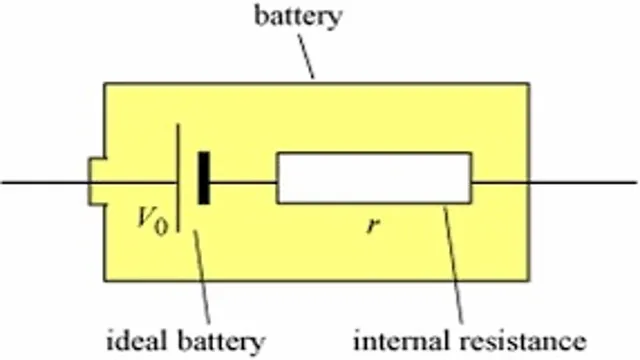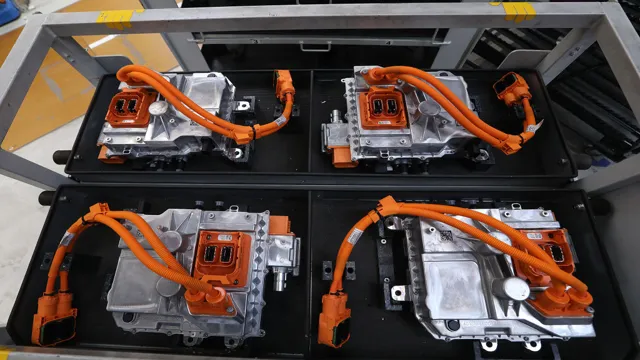Why Batteries in Electric Cars May Not Be as Green as You Think: Debunking the Myths
Electric cars have been touted as a greener alternative to traditional gas-guzzling automobiles, but what about the batteries that power them? With concerns rising about the impact of lithium-ion batteries on the environment, many are questioning whether the environmental benefits of electric cars are simply canceled out by the negative impact of battery production and disposal. So, are batteries in electric cars really bad for the environment? Let’s take a closer look.
Misconceptions About Electric Car Batteries
There are many misconceptions about batteries in electric cars, and one of the most common is that they are bad for the environment. However, this is simply not true. While it is true that electric car batteries can be made using materials that are harmful to the environment, such as lithium, most manufacturers take great care to ensure that their batteries are as sustainable as possible.
In fact, many batteries in electric cars are designed to be recycled and reused, reducing their impact on the environment even further. Additionally, the energy used to charge electric car batteries can come from renewable sources such as solar or wind power, further reducing their carbon footprint. So, while it is important to be aware of the potential environmental impact of electric car batteries, it is also important to recognize that many manufacturers are working hard to mitigate this impact and make their batteries as sustainable as possible.
Myth #1: Electric Car Batteries are not Recyclable
One of the biggest misconceptions surrounding electric cars is that their batteries are not recyclable. However, this is far from the truth. In fact, electric car batteries are highly recyclable and can have up to 95% of their material repurposed for future use.
The most common materials used in electric car batteries are lithium, cobalt, and nickel, which can all be extracted and reused. The batteries can go through multiple recycling processes, and the leftover materials, such as aluminum and steel, can also be recycled. Recycling electric car batteries not only conserves natural resources but also reduces greenhouse gas emissions and lowers the overall impact on the environment.
Thus, electric car batteries are not only recyclable but also contribute to a more sustainable future.

Myth #2: The Production of Electric Car Batteries is Highly Polluting
One of the misconceptions about electric car batteries is that they’re highly polluting to produce. However, this myth is far from the truth. While it’s true that producing batteries does require energy and raw materials, the overall impact is much less than producing gasoline-powered vehicles.
In fact, a study conducted by the Union of Concerned Scientists found that producing an electric car battery results in fewer emissions than producing a gasoline-powered car. Additionally, advances in battery technology have resulted in more efficient production methods that further reduce the environmental impact. It’s important to acknowledge that no product is entirely without environmental impact, but in the case of electric car batteries, the impact is less than that of traditional gasoline-powered vehicles.
Myth #3: Electric Car Batteries Have a Short Lifespan
Electric Car Batteries There’s a common misconception that electric car batteries have a short lifespan, but this couldn’t be further from the truth. Modern electric car batteries are designed to last a long time, up to 10 years or more with regular maintenance. In fact, most electric car manufacturers are so confident in the durability of their batteries that they offer generous warranties of up to 8 years or 100,000 miles.
One of the reasons for this is that electric car batteries have several layers of protection that prevent them from overcharging, overheating, and overdischarging. This means that they are less likely to degrade over time or experience premature failure, especially if they are properly maintained. Another key factor in the longevity of electric car batteries is the sophisticated management system that’s built into these vehicles.
This allows the battery to be charged and discharged in a very controlled way, ensuring that it’s always operating at peak efficiency. The battery management system also monitors the health of the battery and alerts the driver if any issues arise, so they can be addressed before any damage occurs. Overall, the idea that electric car batteries have a short lifespan is just a myth.
In reality, they are designed to last a long time and provide reliable power for many years. If you’re considering an electric car, don’t let this misconception hold you back. With proper maintenance and care, your battery will provide you with many years of driving pleasure.
The Environmental Impact of Electric Car Batteries
While electric cars are viewed as an environmentally friendly solution for transportation, there is a growing concern over the impact of their batteries on the planet. Batteries in electric cars are not inherently bad, but their production contributes to various environmental issues. The manufacturing process of lithium-ion batteries involves the use of rare and toxic materials, such as cobalt and nickel.
The mining and transportation of these materials can cause environmental degradation, air pollution, and water contamination. Additionally, the disposal of these batteries at the end of their life cycle can lead to toxic waste build-up in landfills, which can take hundreds of years to decompose and harm the environment. However, it is important to note that advancements in battery technology and the use of recycled materials can mitigate the environmental impact of electric car batteries.
As the demand for electric cars continues to grow, it is crucial to prioritize developing more sustainable and eco-friendly battery solutions.
The Benefits of Electric Cars
While electric cars may have some environmental benefits compared to traditional gasoline-powered vehicles, electric car batteries come with their own set of challenges. The manufacturing and disposal of these batteries can result in significant environmental impacts. However, the good news is that advancements are being made to reduce these impacts.
For instance, newer electric car batteries are being designed to be more recyclable, and the manufacturing process is becoming more sustainable. Additionally, the use of renewable energy sources to power electric cars can significantly reduce their carbon footprint. All in all, while there are still environmental concerns associated with electric car batteries, the industry is making significant strides towards reducing its overall impact.
The Environmental Impact of Battery Production and Disposal
Electric cars are often touted as a cleaner and greener alternative to traditional gas-powered vehicles. However, the production and disposal of electric car batteries have a significant environmental impact. The mining of raw materials needed for battery production can contribute to deforestation, soil erosion, and pollution of waterways.
Additionally, the manufacturing process requires a lot of energy, which often comes from non-renewable sources, thereby increasing carbon emissions. Once the battery reaches the end of its life, it needs to be disposed of properly to avoid further environmental harm. If not properly recycled, the batteries could leak heavy metals and other toxic chemicals into the soil and water, leading to adverse health effects.
It’s important to consider the entire lifecycle of electric car batteries and work towards more sustainable solutions.
The Advancements in Battery Technology to Combat Environmental Concerns
The advancements in battery technology have been key in addressing environmental concerns that have arisen due to the use of electric car batteries. One primary concern has been the disposal of these batteries, which can have a significant impact on the environment. However, the newer-generation batteries are designed to last longer than traditional batteries, which reduces the frequency of replacements and ultimately lowers the amount of waste produced.
Additionally, the use of more sustainable materials in the production of these batteries has further reduced their environmental impact. For instance, companies are exploring the use of recycled materials, such as repurposing old batteries to extract the materials needed for new ones. Overall, the environmentally-conscious approach to battery technology is becoming increasingly prevalent, and we can expect to see continued advancements in the coming years.
Conclusion and Future Outlook
After carefully weighing the pros and cons, it’s clear that batteries in electric cars may not be all sunshine and rainbows. Despite their obvious environmental benefits, the production and disposal of these batteries can actually have harmful effects on our planet. So, while electric cars may be a step in the right direction, it’s important to remember that there’s always a catch.
But fear not, for we can always turn to our trusty bicycles and scooters for a more sustainable and guilt-free mode of transportation!”
Why Electric Cars are Still a Good Choice for the Environment
Electric cars may have some downsides, but one of the most widely misunderstood is their environmental impact. One of the primary concerns is the environmental impact of electric car batteries. However, the truth is that, despite their complex manufacturing processes, electric car batteries are still significantly better for the environment than internal combustion engines.
Although the production of lithium-ion batteries adds carbon dioxide to the atmosphere, it is a far lesser amount compared to the exhaust emissions from traditional gas-powered engines. What’s more, electric vehicles, unlike traditional cars, can be powered by a variety of sources, including renewable energy sources like solar and wind, meaning that they can be truly emissions-free. All this means that, on balance, electric cars are still a good choice for the environment.
The Future of Electric Car Battery Technology
“electric car battery technology” Electric car battery technology is advancing rapidly, but it’s important to consider the environmental impact of these batteries. While electric cars are more eco-friendly than gasoline-powered cars, the manufacturing process of their batteries still has a significant carbon footprint. However, efforts are being made to make this process more sustainable.
For example, some manufacturers are exploring ways to use recycled materials in their battery production. Additionally, as electric car usage becomes more widespread, the demand for sustainable battery production will increase, driving technological advancements. Despite the current challenges, the future of electric car battery technology looks promising in terms of reducing environmental impact.
FAQs
Why are batteries in electric cars considered bad?
Batteries in electric cars have a limited lifespan and need to be replaced after a period of time. Additionally, the mining and manufacturing of the materials used in batteries can have negative environmental impacts.
Does using batteries in electric cars negatively impact the environment?
Battery production and disposal can have negative environmental impacts, as it requires mining and refining of materials, as well as proper disposal methods. However, using electric cars can still have a positive impact on the environment, as they produce fewer emissions than traditional gas-powered vehicles.
Can batteries in electric cars be recycled?
Yes, batteries in electric cars can be recycled. The process involves extracting and refining the valuable materials within the battery, such as cobalt and lithium, to be used in new batteries or other applications.
How long do batteries in electric cars typically last?
The lifespan of batteries in electric cars varies depending on several factors, such as usage and climate. On average, most electric car batteries last between 8-10 years before needing to be replaced.






